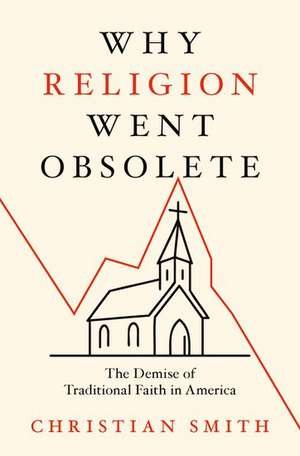Why Religion Went Obsolete: The Demise of Traditional Faith in America
Autor Christian Smithen Limba Engleză Hardback – iul 2025
Preț: 189.23 lei
Preț vechi: 212.70 lei
-11% Nou
Puncte Express: 284
Preț estimativ în valută:
36.21€ • 37.91$ • 29.96£
36.21€ • 37.91$ • 29.96£
Carte nepublicată încă
Doresc să fiu notificat când acest titlu va fi disponibil:
Se trimite...
Preluare comenzi: 021 569.72.76
Specificații
ISBN-13: 9780197800737
ISBN-10: 0197800734
Pagini: 440
Dimensiuni: 156 x 235 mm
Editura: Oxford University Press
Colecția OUP USA
Locul publicării:New York, United States
ISBN-10: 0197800734
Pagini: 440
Dimensiuni: 156 x 235 mm
Editura: Oxford University Press
Colecția OUP USA
Locul publicării:New York, United States
Recenzii
This is an era-defining work. What Herberg's Protestant, Catholic, Jew was in the 1950s, what Lenski's The Religious Factor was in the 1960s, and what Wuthnow's Restructuring of American Religion was in the 1990s, Christian Smith's Why Religion Went Obsolete is to the early 21st century. It is a remarkable work of scholarship and essential reading for anyone keen to understand the perplexing status of religion in contemporary America.
What has driven millions of Americans, especially the younger generations, to desert church pews? Drawing upon a rich multimethod body of evidence, Christian Smith presents an updated Durkheimian argument that American churches lost their core social functions during the late twentieth century due to both major historical events and complex societal developments. This readable study will provide fresh insights into reasons for the decay of religion in America, which has contributed to a fervent cultural backlash among the remaining faithful.
In this provocative new book, one of America's most eminent social scientists marshals a wealth of data and a lifetime of study behind a stunning argument: traditional religion became obsolete starting in the year 1991. Required reading for anyone who wants to understand the precipitous decline of religion in American society.
What has driven millions of Americans, especially the younger generations, to desert church pews? Drawing upon a rich multimethod body of evidence, Christian Smith presents an updated Durkheimian argument that American churches lost their core social functions during the late twentieth century due to both major historical events and complex societal developments. This readable study will provide fresh insights into reasons for the decay of religion in America, which has contributed to a fervent cultural backlash among the remaining faithful.
In this provocative new book, one of America's most eminent social scientists marshals a wealth of data and a lifetime of study behind a stunning argument: traditional religion became obsolete starting in the year 1991. Required reading for anyone who wants to understand the precipitous decline of religion in American society.
Notă biografică
Christian Smith is the William R. Kenan, Jr. Professor of Sociology and Founding Director of the Center for the Study of Religion and Society at the University of Notre Dame. Smith is well known for his research focused on religion, adolescents and emerging adults, and social theory. He has written many books, including Divided by Faith: Evangelical Religion and the Problem of Race in America (with Michael O. Emerson), as well as Soul Searching: The Religious and Spiritual Lives of American Teenagers (with Melinda Lundquist Denton).
